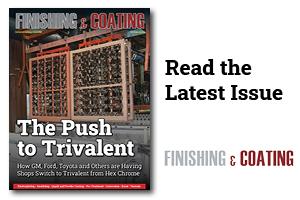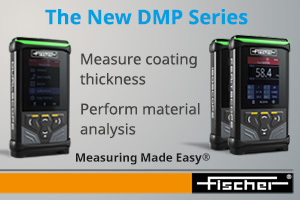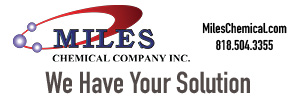Francisco Capacho’s path to success in the United States electroplating industry has taken a circuitous route.
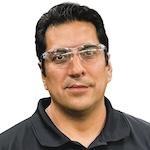 Francisco CapachoThe President and General Manager of Dixon Hard Chrome in Sun Valley, California — about 20 miles north of downtown Los Angeles near Burbank — began his finishing career working at his father’s plating operation near Bogota, Columbia, where he was on the shop floor at age 5 following his father around the complex.
Francisco CapachoThe President and General Manager of Dixon Hard Chrome in Sun Valley, California — about 20 miles north of downtown Los Angeles near Burbank — began his finishing career working at his father’s plating operation near Bogota, Columbia, where he was on the shop floor at age 5 following his father around the complex.
“My parents always took me into the shop,” says Capacho, whose time around the tanks and hoists led him to a chemical engineering degree.
The company had five locations in Columbia, and Capacho eventually rose to lead the company for his family as Operations Manager, but don’t think for a minute he was pampered along the way.
“I was involved with all the rectifiers, everything on the floor, the quality systems, and even hiring the people we had working there,” says Capacho, whose father eventually sold the business.
Reducing Labor Costs and Rejection Rates
He stayed on for a few years as he focused on quality and continuous improvements. By using lean tools and practices he learned from the automotive industry, he saw a 30% improvement in labor cost savings and a 60% reduction in rejections.
When Capacho decided to head out on his own, he found his way to Vancouver, Canada—a more than 4,000-mile trek—where, in 2017, he became Operations Manager at Ebco Metal Finishing. There, he oversaw two facilities and more than 40,000 square feet of finishing space that was some of the largest in Western Canada.
After five years at Ebco, he moved to south to Southern California to run Dixon Hard Chrome, which has over 10,000 square feet in the building complex and an additional 23,000 square feet of storage space for parts and orders.
Dixon Hard Chrome—founded by Richard Dixon in 1955—is a Nadcap facility that focuses on aerospace finishing and offers more than just the hard chrome in its name; the shop also specializes in copper plating and electroless nickel, plating on aluminum, cadmium plating, passivation, etching, and magnetic and penetrant inspection.
“We are definitely in a niche industry. Those small parts are not easy for other people to do. I believe sometimes customers think with these little, tiny parts, you have to send those parts to Dixon. And that’s how we plan to grow.”
Dixon has processed approvals for Boeing, Parker Aerospace, Moog, Northop Grumman, Honeywell, Triumph, Lockheed Martin, Bell Helicopter, Woodward, and many more.
“My focus is to help this company grow,” Capacho says and align with Canerector philosophy, which purchased Dixon Hard Chrome 2018 and is a group of over 50 companies that design and manufacture industrial products across a wide range of industries.
Owners Part of Larger Manufacturing Group
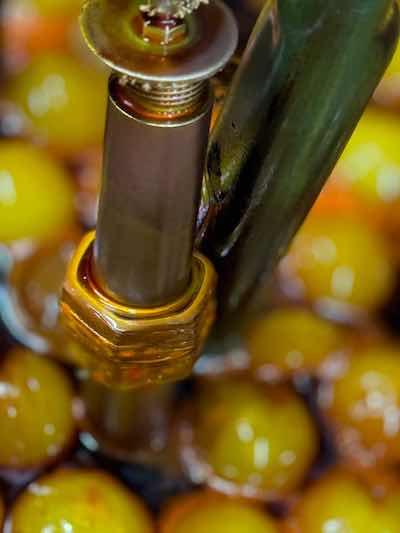 Based in Toronto and family-owned, Canerector says its companies are autonomous and led by entrepreneurial teams with in-depth knowledge and experience. They maintain a long-term focus on growth through reinvestment, support, and acquisitions.
Based in Toronto and family-owned, Canerector says its companies are autonomous and led by entrepreneurial teams with in-depth knowledge and experience. They maintain a long-term focus on growth through reinvestment, support, and acquisitions.
Since relocating to the Los Angeles area to run Dixon, Capacho says he has been amazed at the talent the shop’s team—which now numbers close to 60 people—has for working on smaller aerospace parts that not many other shops want to handle because of their intricacies.
“We are definitely in a niche industry,” he says. “I am inspired by the skills the people here have acquired. Those small parts are not easy for other people to do. And that's what makes us very niche. I believe sometimes customers think with these little, tiny parts, you have to send those parts to Dixon. And that’s how we plan to grow.”
Aerospace accounts for roughly 98% of all their customer work and many of those parts have to be masked and handled before they are sent to be finished. Capacho says that is what sets Dixon Hard Chrome apart, especially with over 65 years of experience in the finishing business.
The shop doesn’t compete with other larger aerospace processers, which have tanks that can only handle parts up to six feet long and weighing less than 75 pounds. So Dixon has worked extremely hard to specialize in complex masking and other specifications.
“We're very capable of masking for those little, tiny pieces with hard masking,” Capacho says. “Fortunately, we have a lot of employees with those skills, which they have learned how to mask out over the years.”
Not Just Limited to Chrome Plating Processes
The smaller parts and Dixon's array of finishes have kept them busy for the past six decades. Aside from the hard chrome, Capacho says they are very busy with their electroless nickel medium-phosphorus tank, as well as their low—and minimal-cadmium and bright cadmium lines.
“We also utilize our copper mostly for a stop off for nitrate, and we see a lot of use of our plate-over-aluminum line, which we can use the copper or the nickel,” he says. “Most customers ask for chrome on top of that.”
Dixon’s management team for working hard on customer server initiatives to reduce lead times and lower rejection rates.
That effort to improve customer satisfaction has Dixon Hard Chrome inching closer to what Capacho wants the company to be known as a one-stop shop for precision aerospace work, offering multiple processes all under one roof.
“It's all about convenience for the customer,” he says. “They can send parts, and we do the mag inspection, the plating, and then the final mag, and we can send that part back to the customers.”
“We have employees that have been here for up to 50 years, and they like working here. We are compliant with the rules, and we take very seriously the safety of our people; we put in all the controls necessary to make sure that the people feel comfortable to work.”
Capacho says they have good relationships with shot peening shops to utilize their capabilities and any other specifications called out in the order. Dixon prefers to handle any extra stops themselves if they don’t have them in-house, but it is rare that they don’t.
“It is very convenient for the customer, just so they don't have to move that part all over,” he says. “For some processes and some specs, there might be only two or three shops in the United States to send the parts because not many people are doing it, such as Boeing’s BAC 5709 for hard chromium plating. We are one of the fewer suppliers who can do that, and it's good for the customers.”
California’s Ban on Chrome Worrisome for Owners
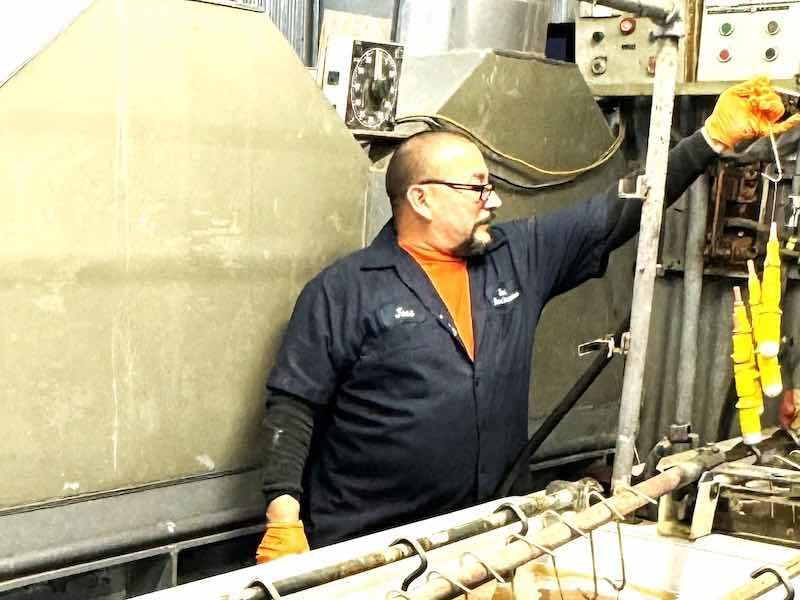 Dixon Hard Chrome is a Nadcap facility that focuses on aerospace finishing and offers more than just the hard chrome in its name.Dixon Hard Chrome, like many shops located in California these days, is worried about the future of businesses like his now that the state is working to shut down the chrome finishing industry.
Dixon Hard Chrome is a Nadcap facility that focuses on aerospace finishing and offers more than just the hard chrome in its name.Dixon Hard Chrome, like many shops located in California these days, is worried about the future of businesses like his now that the state is working to shut down the chrome finishing industry.
In 2023, the California Air Resources Board voted to ban decorative and functional hexavalent chromium plating and anodizing operations in the state. This included phasing out the use of hex chromium in decorative plating by 2027 and for hard plating and chromic acid anodizing by 2039.
For Capacho, the decision to keep Dixon Hard Chrome in the state or move it elsewhere is something to start to think about the coming years.
“We want to grow and put more tanks, processes, and get bigger,” he says.
Capacho says that his shops — and many others in California — do a very good job protecting the environment and ensuring their employees are working safely.
“We have employees that have been here for up to 50 years, and they like working here,” he says. “We are compliant with the rules, and we take very seriously the safety of our people; we put in all the controls necessary to make sure that the people feel comfortable to work.”
He says some new hires report their attitudes about the finishing industry changes very quickly after they start working.
“Once the people join the company and they realize how we operate, then they say, ‘Oh, this is not what I was thinking,’” he says. “People feel comfortable when they walk in, and they feel safe; that tells a lot.”
But Capacho says he and his parent company are looking long-range on how they can service their customers.
“We might look for a succession plan to start, maybe not move, but acquire a company in a nearby state so we can start to work and transition some parts or customers,” he says. “In the meantime, we're going to stay until 2039, and we're going to comply with what we have to do.”
Visit www.dixonhardchrome.com.







